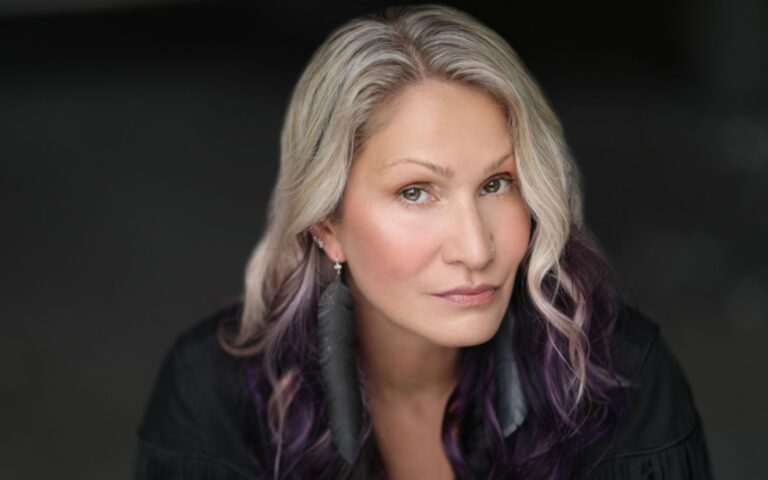By Alexia Bréard-Anderson
Montréal’s premier gathering for electronic music and digital creativity returns with an immersive three-act program bridging AI, XR, Indigenous tech, and ecological imagination.

Dr. Jules Arita Koostachin began making films late in life. After a career in social work, several degrees that culminated in a PhD in Indigenous documentary protocols and processes from the University of British Columbia, and raising four children, she decided the time had come to take the leap. After turning down a tenure track position at Simon Fraser University, Koostachin charged full steam ahead into filmmaking.
“I just got to a point where I like, ‘you got to honour your spirit,’ — especially a creative spirit,” she tells RANGE from her home in Vancouver. “At this age that I’m at now, I’m done putting my passion on hold. Even if I’m poor.”
The risk paid off. Since 2010, Koostachin has made 17 works, spanning shorts, television series, feature documentaries and narrative films. Her most recent doc, WaaPaKe, won the Best BC Film Award at the Vancouver International Film Festival last year. The experimental non-fiction work invites Indigenous people across Turtle Island to take part in a circle of truth, sharing their experiences with Canada’s residential school system. The film zooms out as it zooms in, looking at the legacies of trauma as they pass down across generations, while taking on a deeply personal bent as Koostachin herself steps in front of the camera along with her mother and son.
Koostachin views cinema as a means for filling the void, for adding to conversations notably omitted from the mainstream. “I always see my work as a way to create some sort of Indigenous archive, so future generations can actually access these cultural stories.” As a former social worker and certified counsellor, she sometimes refers to her art as therapeutic cinema or ceremonial films, offering audiences the curative benefits of connecting to each other and to themselves. After struggles with perimenopause and dismay with the lack of resources surrounding women’s health, Koostachin made KaYaMenTa: Sharing Truths about Menopause (2020). “I became the menopause queen,” she shares. “People started having menopause parties, and I’m still being invited to talk about that film to this day.”
Her debut feature Broken Angel (2023) follows a young Cree mother grappling with an abusive boyfriend. The first act paints a harrowing portrait of the realities of intimate partner violence and the particular racialized brutality Indigenous women face. However, in keeping with Koostachin’s therapeutic ethos, the ensuing narrative provides a blueprint for healing through community, tradition, and returning to the land.
“The work that I do is always a reflection of what I don’t see and what I want people to be able to access,” shares Koostachin. “I see it as a way to start the conversation, to scratch the surface and get the dialogue going, so other filmmakers can pick up where I’ve left off.”
This filmmaking philosophy crystalized through Koostachin’s scholarship. While pursuing her PhD in Indigenous documentary practices at UBC, she developed a methodology for ensuring reciprocal relations between storytellers and film subjects. “I was interested in finding out how to share Indigenous story and do it in a way so we’re not exploiting or extracting narratives from community,” she explains.

Applied on a film set in the real world, those protocols look like hiring as many Indigenous crew as possible, having an on-call counsellor available at all times, and allowing documentary subjects to review footage of them and consent to its use after the fact. They also mean lifting up workers who haven’t had a fair shake in the business. “As a social activist I want to make sure that we’re addressing the gender disparity within the industry. I want to provide up-and-coming filmmakers real opportunities on my set,” she says. “Not just, ‘P.A., go stand in the parking lot,’ but meaningful opportunities. Because that’s how we grow, we’ve got to build capacity.”
It’s those opportunities that she sees missing from non-Indigenous productions. Oftentimes, instead, underrepresented filmmakers are invited on set to shadow as a means of meeting a diversity quota. “Why do we always have to shadow? It’s like, ‘Holy crap! I’ve already made six films! I think I can do this now,” she says with a laugh. But there’s an upside to the gatekeeping. “With all these mentorship and training programs and forcing Indigenous people to self-produce, we’re actually becoming quite savvy and sharp and resourceful. So we’re getting really damn good at what we’re doing because we’re forced to do it without a lot of resources,” says Koostachin. “So watch out world.”
WaaPaKe is available now for free streaming across Canada on nfb.ca. Koostachin’s forthcoming fiction feature film Angela’s Shadow will be screening at the Vancouver International Film Festival Oct. 2 and 5 with the filmmaker in attendance for a Q&A
By Alexia Bréard-Anderson
Montréal’s premier gathering for electronic music and digital creativity returns with an immersive three-act program bridging AI, XR, Indigenous tech, and ecological imagination.
By Adriel Smiley
Ian Mark Kimanje’s powerful documentary traces Carnival’s roots from slavery and survival to global celebration.
By Liam Dawe
With genre-defying bookings and once-in-a-lifetime artist pairings, the 46th edition keeps rewriting the folk playbook.